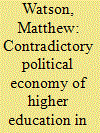| Srl | Item |
| 1 |
ID:
108426


|
|
|
|
|
| Publication |
2011.
|
| Summary/Abstract |
In recent years, improved biosurveillance has become a bipartisan national security priority. As has been pointed out by the National Biosurveillance Advisory Subcommittee and others, building a national biosurveillance enterprise requires having strong biosurveillance systems at the state and local levels, and additional policies are needed to strengthen their biosurveillance capabilities. Because of the foundational role that state and local health departments play in biosurveillance, we sought to determine to what extent state and local health departments have the right capabilities in place to provide the information needed to detect and manage an epidemic or public health emergency-both for state and local outbreak management and for reporting to federal agencies during national public health crises. We also sought to identify those policies or actions that would improve state and local biosurveillance and make recommendations to federal policymakers who are interested in improving national biosurveillance capabilities.
|
|
|
|
|
|
|
|
|
|
|
|
|
|
|
|
| 2 |
ID:
103538


|
|
|
|
|
| Publication |
2011.
|
| Summary/Abstract |
The Coalition government's first Comprehensive Spending Review will cut 40% from university budgets by 2014. This will result in an increasingly tension-prone political economy of UK higher education. As it is, the sector already sits uncomfortably astride the two distinct welfare models currently in existence in Britain. As the fees agenda has taken hold, university degrees have been increasingly susceptible to being rebranded as a strategic investment in the future, thus acting as an exemplar for the move towards an asset-based system of welfare. Despite this, even in the post-Browne world students will still not be charged the full market price of delivering degree programmes. Higher education institutions therefore continue to be redistributive mechanisms providing long-term welfare-enhancing transfer payments to their overwhelmingly middle-class student base. The budget cuts and the associated changes to student finance will bring into stark relief the contradictions of serving two welfare masters at once.
|
|
|
|
|
|
|
|
|
|
|
|
|
|
|
|
| 3 |
ID:
118951


|
|
|
|
|
| Publication |
2013.
|
| Summary/Abstract |
This article focuses on Adam Smith's largely sympathetic response to the Rousseauian critique of the moral degeneracy of modern 'economic man'. It thus emphasises his philosophical ambivalence towards commercial society over the textbook IPE presentations which ascribe to him an almost wholly unreflexive market advocacy. In doing so it provides important methodological lessons for the study of Everyday IPE today. Arnaldo Momigliano has identified a decisive break in historical method in the eighteenth century, of which Smith and Rousseau were key exponents. However unwittingly, contemporary Everyday IPE scholars are the spiritual heirs of the eighteenth-century move from writing public histories of the state to writing private histories of unnamed individuals who embody the most recent phase of human sociability. The eighteenth-century economic man was conceptualised in relation to evolving forms of economic organisation, where the economy in turn was thought to reflect the prevailing system of 'manners'. Smith united with Rousseau in the belief that their society's bourgeois politeness allowed materialist ideologies to corrupt the moral autonomy of the individual. The historical method underpinning such concerns also allows Everyday IPE scholars to ground similarly-styled attempts to understand threats to moral autonomy arising from the struggle over economic surplus today.
|
|
|
|
|
|
|
|
|
|
|
|
|
|
|
|
| 4 |
ID:
116887


|
|
|
|
|
| Publication |
2012.
|
| Summary/Abstract |
Friedrich List's National System of Political Economy continues to be positively received in ipe, where it is treated as a seminal text in development theory. Only a handful of ipe scholars have questioned the specific history of economic ideas through which List asserted the distinctiveness of his own position. They do so by showing that he deliberately put words into the mouths of his classical political economy predecessors to provide himself with something to argue against. His alleged authority on development issues rests in particular on purposefully caricaturing the arguments of Adam Smith. I use this article to suggest a plausible reconstruction of the route to List's Smith, one which recognises the possible intermediary influence of the early Dugald Stewart, John Ramsay McCulloch, the Earl of Lauderdale and Georg Sartorius. By following this complex trail to List's rather eccentric Smith historiography, it becomes possible to break down one of the most important oppositions in ipe pedagogy: that between List's National System and Smith's Wealth of Nations. It also becomes necessary to engage more circumspectly with List's history of economic ideas when searching for the origins of contemporary critically minded development theory.
|
|
|
|
|
|
|
|
|
|
|
|
|
|
|
|
| 5 |
ID:
108431


|
|
|
|
|
| Publication |
2011.
|
| Summary/Abstract |
After the detonation of an improvised nuclear device, several key actions will be necessary to save the greatest number of lives possible. Among these tasks, the identification of patients with impending acute radiation sickness is a critical problem that so far has lacked a clear solution in national planning. We present one possible solution: the formation of a public-private partnership to augment the capacity to identify those at risk for acute radiation sickness.
|
|
|
|
|
|
|
|
|
|
|
|
|
|
|
|
| 6 |
ID:
105418


|
|
|
| 7 |
ID:
084382


|
|
|
| 8 |
ID:
077418


|
|
|
|
|
| Publication |
2007.
|
| Summary/Abstract |
A consistent theme of the existing literature is that fair trade consumption practices represent acts of justice. In this article I investigate such an equation from the perspective of the moral theory of Adam Smith. Smith explains the development of moral sensibilities via an imaginative act he calls `sympathy'. For Smith, justice prevails in interpersonal relationships in which the potential for one person to do harm to another is ruled out because their respective imaginations are in perfect accord, thus creating a situation of mutual sympathy. I advance two main conclusions. First, I argue that fair trade consumption is undoubtedly a moral act in the manner described by Smith, as it involves consumers responding to fair trade campaigns in order to trigger their moral sensibilities through exercising their imaginative faculties. Second, though, I argue that fair trade consumption is not specifically a moral act of justice in the manner described by Smith. The structure of fair trade invites the First World consumer to display sympathy for the Third World producer, but it provides no means for that sympathy to be reciprocated. As such, instances of genuine mutual sympathy do not arise. From a Smithian perspective, fair trade consumption practices are an act of beneficence rather than an act of justice. They thereby reside in the realm of private virtue rather than the realm of public duty, with significant implications for the way in which trade justice is conceptualized and studied in IPE
|
|
|
|
|
|
|
|
|
|
|
|
|
|
|
|